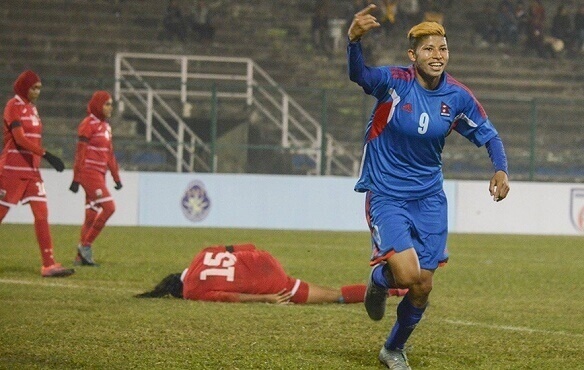See Nepali women’s football team lift SAFF championship
Three ways to realize the vision:
1) Increase women footballers’ international match exposure.
2) Improve the women’s domestic leagues.
3) Construct and upgrade our training facilities.
I come from a small village in Lamjung district. Growing up, I used to play football that was crafted out of old clothes and socks with the neighborhood boys. Everyone played barefoot, and I never asked my parents to buy me a pair of cleats, which they couldn’t afford in any case. But I knew I wanted to become a footballer. I feel lucky that my dream has come true—and so soon.
At the same time, I also feel there is more responsibility and expectation on my shoulders. Individually, I have improved over the years. But my personal achievements will be meaningful only when Nepal’s women football team can prove that they are the best in the region. This is something I dream for myself as well as for my country.
When I was young, I used to listen to the radio. I used to hear of Nepal’s women football stars Anu Lama and Jamuna Gurung scoring for the national team. I dreamt of playing with them one day. That dream came true. Then I set a new target of becoming the top career goal-scorer for Nepal, which I have also fulfilled.
As soon as we achieve something, our priorities change. So for now, my only focus is lifting the SAFF Championship trophy. Our team has made it to the final four times but missed out on the trophy each time. To become champions, we need to improve on many fronts.
Nepali women’s football was in dire straits not long ago but there have been some positive changes of late. For example, the All Nepal Football Association (ANFA), the apex body of Nepali football, has introduced a system of equal pay for men and women footballers. This is a historic decision as wage discrimination is still prevalent in many European countries. Unsurprisingly, it has also come as great motivation for the women’s national team.
Domestic leagues have also helped us to improve our game. Previously, there were no league games. The team had to rely on international fixtures for match exposure, and these fixtures were few and far between. Ahead of international matches, selected players were invited for a 10-15 days of closed camp. Without enough playtime, we could not keep up, let alone compete against other countries. But now we are playing more matches, both at home and abroad.
International match exposure is important if we are to excel in this sport. I realized this when I joined Gokulam Kerala FC based in Calicut, Kerala. I have learned a lot playing for the club. Why does India dominate us in international matches? Simple—they have more experience playing on the international stage.
Nepal’s women’s league still has a lot of room for improvement. While me and my teammates are happy that we at least have a regular league to play in these days, we also feel that playing for two months a year is nearly not enough to succeed internationally. There should be more leagues because not every player gets the opportunity to go and play for international clubs.
We should also lobby and work with government representatives to establish a better sporting culture. The corporate sector should contribute by sponsoring games and athletes.
The field of sports is one of the most resource-intensive and players can never give the desired result without the right investment. Proper gear, diet, and other facilities are a must to succeed.
In many countries, both the corporate sector and the government facilitate players. I know we are a poor country and there are many constraints, but we must at least try to emulate some of their efforts.
In sports, spectators play a key role. Every one of us needs fans, well-wishers and critics to improve our performance. Our supporters fill the gap left by our government, officials, and sports associations. Their encouragement inspires and keeps us going.
It is also important for us to get some training in European countries, which have the best footballing culture in the world. We have distinct deficiencies in infrastructure too. We haven’t played many games at the Dasharath Stadium, which is the only decent football pitch in the country that could host international games. We don’t even practice there. To train, we are sometimes sent to eastern Nepal and sometimes to western parts. This is because we lack a proper training facility.
If these shortcomings can be removed, I believe Nepal women’s national football team will start winning international titles.
Nepal is set to host the 6th SAFF Women’s Championship in August 2022. My big dream is to lift the trophy on our home turf this time.

Quick Questions:
What would you be if you were not a footballer?
Not sure. Maybe a social worker.
What is your best memory of playing for Nepal?
When we defeated India 2-1 in the Hero Women’s Cup in 2019. I had scored both the goals.
Who is your favorite footballer?
Cristiano Ronaldo.












